By Robin Bruss
CEO, Cape Thoroughbred Sale Co.
When
Wise Dan crossed the line to win the Breeder’ Cup Mile (gr. I) and endorse his
status as the highest-rated horse in America, he did more than establish
himself at the forefront of Horse of the Year honours—his victory was felt with a certain sense of pride by breeders in an
unlikely part of the world—South Africa.
Wise
Dan’s dam is by the South African-bred champion Wolf Power, whose 18 wins and
Horse of the Year honours at home attracted the attention of John Gaines in the
good old days when diversity was
seen as a strength, rather than a barrier to commercial markets. Hybrid vigour through an
international outcross was popularised by Bull Hancock and John Gaines, scouring
the world for the exceptional, regardless of fashionability. Great horses,
after all, can create their own desirability.
Bull
Hancock fittingly played another part in the construction of Wise Dan’s South
African connection too, as he stood South African-bred champion Hawaii at
Claiborne following his election as champion turf male in the U.S. back in
1969. Hawaii became broodmare sire of Hennessy, grandsire of Wise Dan, giving
South Africans a double dose of pride, albeit somewhat distant. After all, what
is a decade or three in the development of a pedigree.
What
both stallions had in bucketloads was what South Africa prides itself on—toughness
and soundness, for we are a country built on wide open spaces, plenty of
sunshine, some of the most beautiful and some of the harshest territory
imaginable—and a medication policy tougher than most jurisdiction, barring
perhaps Germany.
South
African yearlings are also cheap by international standards because we are
marginalised, somewhat by geography, but moreso by logistics and regulations.
We would love to send more of our horses to the U.S., but since 9/11, direct
scheduled cargo flights were stopped and all cargo travels via Europe. As the
Europeans require our horses to quarantine 40 days prior to export and America
requires the horses to quarantine 60 days on arrival, it’s made the logistics
somewhat tortuous. Currently we are exporting via the island of Mauritius, four
hours by air into the Indian Ocean.
The
answer to easier exports is to be found in a newly developed diagnostic test
for African Horse Sickness, the PCR Assay, which provides conclusive diagnosis
of freedom of this disease within a matter of hours. The PCR is undergoing
international validation as I write this, and hopes are high that it will
create a scenario for South Africa to readily enjoy greater freedom of
movement, which we haven’t seen much of since the heady days of Hawaii and Wolf
Power who were, in those days, shipped out at a few days notice and arrived in
the U.S. Similarly, the current USDA protocol for South Africa needs updating
for it was established in 1958, has served its time well, but everyone recognises
that an update is overdue.
My hope
is that the new PCR will permit reduction in quarantine from 60 days post arrival
to perhaps 14 days, and that this will allow a whole range of constructive and
dynamic possibilities that will allow our brand of the Thoroughbred to engage
in other parts of the world.
It was intrepid
out-of-the-box thinking that led Team Valor’s Barry Irwin a decade ago to start
buying South African horses and shipping them through the tortuous gamut of red
tape and quarantines in order to race internationally. I love a challenger to
convention and love to see trailblazers get rewarded. Barry had some
spectacular success with South African horses—winning grade I races in Dubai,
Hong Kong, and the U.S. and selling some of his fillies in the millions of
dollars. Irwin also now retains a
band of grade I-winning mares in South Africa, breeding them to the top sires.
He sees South Africa as a true emerging market.
Wasn’t
it John F. Kennedy who said that “we go to the moon not because it is easy, but
because it is hard, and because it will test the best of our courage and
resourcefulness.” Well, we feel
like that in South Africa, too. Contrary to some opinions, we aren’t on a
different planet, but we like to think our horses have developed differently to
convention because of our isolation and that we can offer something different,
but at the same time, with a dose of good old fashioned value. Thirty years
ago, the South African Rand and the U.S. dollar were on par. Today, given the
tide of history, politics and economics, US$1 buys you R8.50 and makes South
African horses incredibly cheap.
In 2011,
South Africa’s major breeders set up the sales company that I run, Cape
Thoroughbred Sales, specifically to operate an internationally advertised sale
out of the world’s most beautiful city, Cape Town, in the international
convention centre, in what is a unique constructed indoor sale. We host
visitors from 15 countries; we showcase our horses and our nation and we do so
with a measure of aplomb.
Racing
and selling, we think, is more than business, it’s about entering the unique
world of the great game of racing, and we use our sales, to create a series of
lifestyle events. For what is a sale without the parties, the cameraderie, and
the champagne that goes with it. Think of it like Keeneland-on-Broadway, with
golf in between. The Cape summer is also rather like Bermuda in glorious
sunshine, blue skies, long warm days and party time at night. Isn’t buying and owning horses meant to
be fun?
Shiekh
Hamdan probably epitomises our sale best, in that he bought Soft Falling Rain
(by U.S.-bred National Assembly, a son of Danzig) from an imported Giant’s
Causeway mare, at the 2011 sale, for R340,000 ($40,000) marginally below the
sale average. The 300 horse sale has yielded three of the four winners of South
Africa’s grade I juvenile races, and the best of these, Soft Falling Rain, became
champion 2-year-old male. He is currently on his way to compete in the Dubai
Carnival 2013 for the Sheikh and trainer Mike de Kock.
Most
foreign buyers leave their purchases in South Africa to race—training fees are
less than $1,000 a month, a low-cost nursery, with a nice springboard—so owners
have a good tax-deductible excuse to return, and for the smart and the lucky,
the best of these youngsters will wend their way into international competition
on the Barry Irwin pathway—with a dose of patience and perseverence through the
quarantine process. It’s not easy, but as JFK observed, Americans are up to a
challenge.
In
January, Kip Elser and Terry Finley came to the sale, they bought a colt by
American-bred grade I winner Var (by Forest Wildcat) for R600,000 as a pinhook,
which is rare in our country. Re-offered at the Nov. 3 Ready to Run Sale, he
sold for R1.6 million. A cool million profit. Americans, I realise, can teach
us a trick or two. Ah, the intrepid and the brave. Here we go again.
I write
to this inform and not to advertise. You’ll find us at www.capethoroughbredsales.co.za.
View a video about the Cape Premier Yearling Sales, last week
of January. We’d love you to come and visit, to allow yourself some South
African hospitality and a chance to see how we do it in our corner of the
globe.
We’ll
have bigger dreams in time to come, including shuttle sires, American
partnerships, perhaps a Breeders’ Cup series, the building of all-weather tracks,
structural changes to advance purses and easier trade routes. But that’s for
another day.
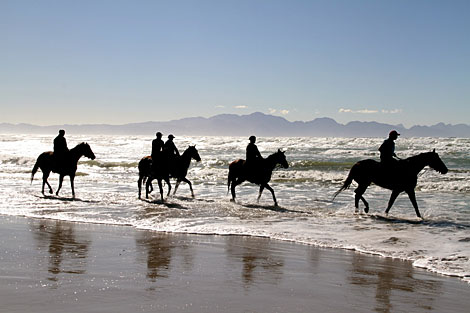
Horses on the beach in picturesque Cape Town, South Africa.
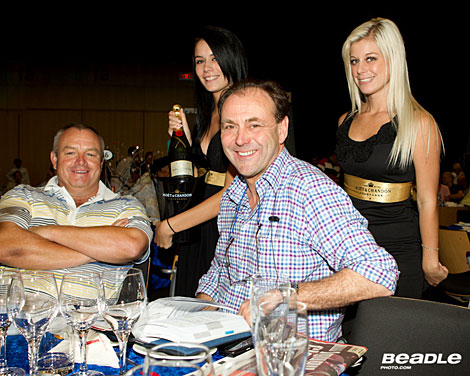
Mike de Kock and Angus Gold receiving a champagne gift from Cape Thoroughbred Sales Co.
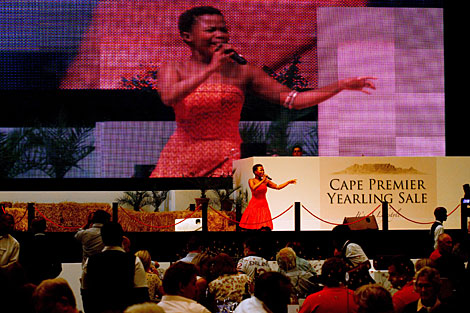
Zolani Mahola performs at the 2012 Cape Premiere Yearling Sale.
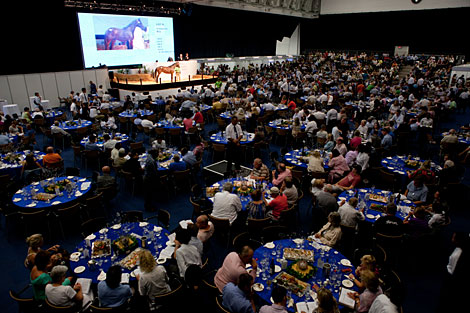
Inside the Cape Town International Convention Centre. Site of the Cape Premiere Yearling Sale.
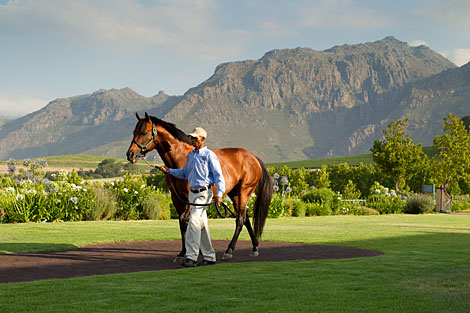
Sale Preview location surrounded by the beautiful landscape of Cape Town , SA.




